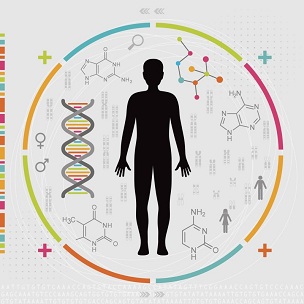Precision Epidemiology Approach Involving Screening Of Host Gene Variants Can Provide Explanations For Variability In COVID-19 Symptoms And Severity
Source: Precision Epidemiology Oct 21, 2020 4 years, 6 months, 5 days, 19 hours, 20 minutes ago
Precision Epidemiology: Finally more and more researchers are waking up to fact that COVID-19 cannot be treated in a broad spectrum manner as a personalized or precision medicine approach has to be undertaken to treat every individual as there are so many factors at play including the human host genes and variants from one person to the next coupled with fact that even strains of the virus that are infecting the patient need to be identified as it is now emerging that every virus strain or mutation has a different pathogenesis contrary to what was first thought. Besides these, numerous other factors are at play as well including existing comorbidities, present detailed immune profile and even previous infections with other pathogens etc.

In a new study by researchers from National Taiwan University,representing the first steps towards this approach, a multi-omics approach of how mutations in angiotensin-converting enzyme 2 (ACE2) and transmembrane protease serine 2 (TMPRSS2) affects infections with SARS-CoV-2 and the progression of COVID-19 was studied.
The study findings were published on a preprint server but are currently being peer reviewed.
https://www.biorxiv.org/content/10.1101/2020.10.19.345140v1
The ACE2 is the human receptor that COVID-19's causative agent SARS-COV-2 typically uses to bind to host cells, and TMPRSS2 is the enzyme that activates the viral spike protein for membrane fusion.
Based on detailed genetic analysis of both the ACE2 and TMPRS22 genes, Professor Dr Eric Chuang and colleagues report on findings from a comparative analysis of the single nucleotide polymorphisms (SNPs) that may contribute to variability in COVID-19 symptoms among sub-populations.
The study team that also comprises Dr Amrita Chattopadhyay, Dr Tzu-Pin Lu, Dr Ching-Yu Shih, Dr Liang-Chuan Lai, Dr Mong-Hsun Tsai, also report on calculations of the prevalence of structural variations amongst populations and a study of expression patterns across all human tissues.
The study team said, "This work is a good first step to be followed by additional studies and functional assays towards informed treatment decisions and improved control of the infection rate.”
The Precision epidemiology approach using genomic technologies enables a targeted approach towards infectious disease control. It includes genome-based approaches to provide information on molecular diagnosis and treatment regimens at both the population and individual level. Precision epidemiology is currently the urgent need of this pandemic.
To date, the disease course in cases of COVID-19 is highly variable, ranging from mild or asymptomatic to severe and potentially fatal.
Besides known risk factors associated with severe disease such as older age and co-existing comorbidity, such variability in symptoms and outcomes may be explained by genetic architecture differences, suggest Dr Chuang and colleagues.
Dr Chuang said,"It is necessary to identify variants of the ACE2 and TMPRSS2 genes that confer higher susceptibility to fatality and symptoms.&am
p;rdquo;
The study team however says a susceptibility gene may likely have low penetrance, meaning not all carriers will develop COVID-19. Furthermore, specific environmental factors may affect the degree of transmission and severity of infections.
Hence the study team has presented multiple lines of supporting evidence from multi-omics data, including information on SNPs, structural variations such as copy number variations (CNVs), and gene expression patterns, to show how such approaches can help identify COVID-19 risk factors.
The study team used an online database they developed called VariED, which provides annotation and expression profiles for variants related to human diseases, to obtain allele frequencies for all SNP variants from both ACE2 and TMPRSS2 for different global sub-populations.
The team identified SNPs in both ACE2 and TMPRSS2 that had higher allele frequencies among Africans and East Asian populations than among Europeans and Americans.
Dr Chuang and the team say that Africans exhibited particularly significant variation for most SNPs, which may indicate differential susceptibility towards coronavirus in the respective populations.
The study team used a web-based system they developed called CNVIntegrate to study the candidate genes' CNV frequencies in the control cohort ExAC, which consists of healthy individuals from global sub-populations, and the control cohort TWCNV, which consists of healthy Taiwanese individuals.
The team calculated the duplications and deletions frequencies for both ACE2 and TMPRSS2 among the two cohorts.
Interestingly for ACE2, no duplications or deletions were observed among either population. For TMPRSS2, duplication was observed in 0.06% of samples from TWCNV and in 0.014% of samples from ExAC. TMPRSS2 deletion was also observed in 1.08% of TWCNV samples.
Dr Chuang and colleagues say this suggests that these variations are rare among healthy cohorts and provides evidence that they could be pathogenic.
The study team used a database tool they developed called CellExpress to study ACE2 and TMPRSS2 gene expression patterns across all human tissues, stratified by gender and age.
However the gene expression data for baseline healthy populations did not show any significant difference in gene expression levels between males and females, with the exception of the pituitary gland. Similarly, no significant difference was observed when gene expression was stratified by age.
A search for both genes across all tissues in cancer datasets did however reveal high expression levels of both ACE2 and TMPRS22 across all tissues, with no effect of gender and age.
Dr Chaung said,"This study conducts genetic probing with the intention of explaining the variability in symptoms and diverse outcomes of COVID-19. It provides some significant findings (SNP, CNV, and gene expression) from ACE2 and TMPRSS2, as evidence, for a plausible place to start looking into them.”
The study team said, "The work is a good first step to be followed by additional studies and functional assays that could potentially evaluate the findings to identify patients who may be at a higher risk of COVID-19-related mortality or infection, towards informed decisions for treatment and cure.”
For more on
Precision Epidemiology and precision or personalized medicine approaches to treat COVID-19, keep on logging to Thailand
